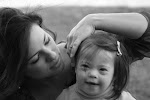I read Expecting Adam when Bridget was about four months old. A friend of my mom's had read it and sent it to me, knowing that it would be of particular interest given Bridget's diagnosis and my love of literature.
You might see the book listed as a "must-read" on the sidebar of many Ds blogs, and notice the mysterious, blurred image of a woman standing alone on the front cover. It is a beautiful story with mystical and otherworldly elements, but it is not a book for the faint of heart, and may or may not be suitable for those with a brand-new diagnosis (depending on the person).
While filled with lovely imagery and deep awareness, Expecting Adam also deals with some of the more heartbreaking aspects of raising a child with Down syndrome. Beck does not mince words, which I like. While making it clear that she adores her son, Adam--she actually sees him as an angel--Beck is straightforward (blunt, really) in her use of the "R" word and unapologetic for it. She uses the term in a clinical way, not to put Adam down, and I think also to address directly the close association of the word "retarded" with the words "Down syndrome". It is a difficult topic, but one we all come across at some point. This might be tough for readers who are too early in the journey, too new to the diagnosis.
I read the whole book in a matter of hours and--though I kept feeling confronted by words and images I couldn't yet reconcile--came to appreciate Beck's honesty. I knew she was addressing issues that I, too, had either already considered or would face in the future. It was a challenging read in some ways, but the book (and Beck's perspective) helped me work through my own thoughts and feelings on parenting Bridget and on Ds, disability and developmental delays.
Today, despite still feeling slightly out of my comfort zone sometimes, I'm less caught up in semantics. (I'm not quite as sensitive, though I know well the importance of language and the words we choose to use. I still have a hard time with the "R" word because of the connotations, but developmental delays are a major part of Ds. In fact, that aspect might be the only thing all of our children have in common other than the extra chromosome itself.)
I don't let what other people say affect me as much as I used to, because I see Bridget for the person she is. I'm very much of the it-is-what-it-is mindset. Bridget is awesome and she is developmentally delayed. I'm very sure about both.
On a side note, I recently read an interesting interview with Beck. (Read the whole interview here.)
I'm curious...does anyone else have thoughts or comments on Expecting Adam, or on coming to terms with their child's Down syndrome diagnosis/developmental delays?
*Expecting Adam was written in the late '90s, before "people first" language and campaigns to end use of the "R'' word came to the forefront of the disability rights movement.
All Feeling Better
14 years ago











I read the book when I was pregnant with Lila and loved it. I appreciated the honesty. I am so acutely aware of Lila's delays. I guess I'm weird but instead of making me sad, most of the time it just makes me so acutely aware of her accomplishments! Every time she learns something new or begins to understand a new concept it is a victory. And boy do we celebrate. She makes my heart happy. It saddens me that some people will never give her a chance based on her diagnosis. In my heart I truly believe it is their loss. It also makes me sad that people feel sorry for me because Lila has DS. They will never be able to understand that she is an angel, our gift from God. She has softened my heart and changed my life. Sorry to go on and on....
ReplyDeleteYou and I both agreed that it is what it is - and that is just the deal. We are playing it. I grew up in a home where that word was never used as an insult. My parents simply didn't use it and would have popped us one if we had.
ReplyDeleteHaving said that I have started to "take it back" if you will. When I speak to groups who want to hear our story, at the end I hold up a picture of Larkin or I hold her up if she is with me. I say to the crowd. My daughter has mental retardation. She is retarded by medical definition. If you use that word THIS is the little person you hurt. THIS is the victim of your hate speech. It's an ugly word when parents hear it used in an insulting manner and if I have to get down to ugly to make you appreciate just how hurtful it is - then by all means here I am. Don't use the word.
That is how I end most every speaking engagement. :) It's effective my friend.
I work in mental health and the R word is a clinical term with a very specific meaning to describe only a symptom. However, I am very sensitized to it now and even if used clinically it is jarring. The pejorative use is due to the negative judgement attached to delays and differences in cognition. More is not necessarily better in many situations and this is one of them! I prefer cognitive and developmental delays and learning disabilities since those terms are more accurate and less judgemental. We all have to find our own way to navigate thru the prejudices and negativity but the one thing we do know is--- our children are special, in a good way!
ReplyDelete